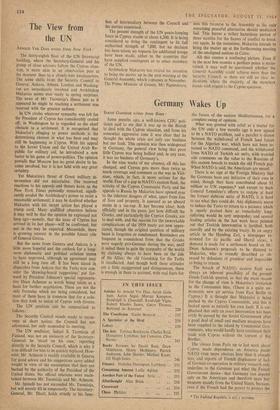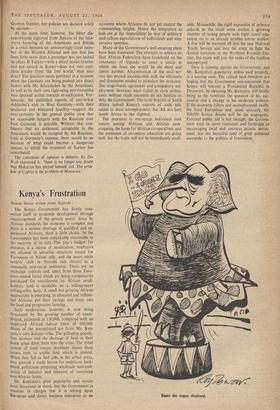Germany Wakes Up
SARA!! GAINIIAM writes from Bonn:
Some months ago, a well-known CDU poli- tician said to me that it was up to the British to deal with the Cyprus situation, and from his somewhat aggressive tone it was clear that he thought the whole crisis not only our business but our fault. This opinion was then widespread in Germany, the general view being that poor little Cyprus was being bullied and, in any case, it was no business of Germany's.
In the nine weeks of my absence, all this has changed, and Cyprus gets more than twice as much coverage and comment as the war in Viet- nam, which, in fact, is more serious for the world. Fear of a gap in NATO's eastern flank, the activity of the Cyprus Communist Party and the appeals to Russia by Makarios have opened eyes to the inherent dangers of what, apart from loss of lives and property, is assessed as an absurd storm in a tea-cup. It has become clear, both officially and in the press, just how difficult the Greeks, and particularly the Cypriot Greeks, are to deal with, and the reasons for the 'unworkable complications of the 1959 treaty are now appre- ciated, though the original queStion of military bases is forgotten or condemned. Reminders are frequent in roundabout form that the Greeks were eagerly pro-German during the war, until it suited them to gain the sympathy of the world by claiming always to have been on the side of the Allies; the old friendship for the Turks is recollected. And though both these attitudes are a little exaggerated and disingenuous, there is enough in them to account, with real fears for the future of the eastern Mediterranean, for a complete swing of opinion.
What was greeted with relief as a matter for the UN only a few months ago is now agreed to be a NATO problem, and a parallel is drawn between the withdrawal of French land forces for the Algerian war, which have not been re- turned to NATO command, and the withdrawal from NATO of Turkish air units, with worried side comments on the value to the Russians of this eastern breach to match the old French gap. When NATO is said, the Americans arc meant.
There is no sign at the Foreign Ministry that the Germans have any initiative of their own in mind, though they have contributed about $1 million to UN expenses,* and except to back. General Lemnitzer's efforts to restore at least the former dubious unity of NATO, it is hard to see what they could do. Any diplomatic move to induce the Turks to return to a patience which is openly praised here as remarkably long- Offering would be very unpopular, and several leading articles in the last week have pointed Out that Turkish intervention is justified, both morally and by the existing treaty. In an angry article in the Hambug Zeit, a newspaper re- nowned for its pacific and liberal views, n demand is made for a settlement based on Mr. Dean Acheson's proposals to be dictated to Makarios, who is roundly described as ob- sessed by delusions of grandeur and impossible to bring to reason.
The breach of NATO's eastern flank was always an inherent possibility of the present Greek-Turkish quarrel, so that the main reason for the change of view is Makarios's invitation to the Communist bloc. (There is a quite un- economic new air service from East Berlin to Cyprus.) It is thought that Makarios is being pushed by the Cyprus Communists, and this is looked upon as entirely his own fault. It is em- phasised that only an overt intervention has been coyly by-passed by the Soviet Government after a good deal of small and medium weapons have been supplied to the island by Communist Gov- ernments, who would hardly have continued their trade with Cyprus without the consent of Big Brother.
The silence from Paris up to last week about Cyprus made dependence on America inside NATO even more obvious here than it already was, and reports of French displeasure at lack of German co-operation in military research only underline to the Germans just what the French Government denies—that Germany can depend only on the Americans and therefore must buy weapons mainly from the United States, because, even if the French had the power to protect the The Federal Republic is not a member. German frontier, her policies are dictated solely by egotism.
At the same time, however, the bitter dis- appointment reported from Ankara at the luke- warm havering of the Americans and British in a crisis between an unwaveringly loyal mem- ber of the Western Alliance and one that has been little more than a passenger has not lacked its effect. If Turkey—with a direct Soviet frontier and her record in Korea—does not rate com- plete loyalty from 'the free world,' then who does? The question seems pertinent at a moment when the Germans are being pushed into direct feelers with Mr. Khrushchev by the Americans, as well as by their own right-wing neo-romantics who demand action towards re-unification. For- tunately, the published reports of son-in-law Adzhubei's visit to West Germany—with their unaltered and blinkered hostility—support the near-certainty in the general public view that no reasonable bargain with the Russians over East Germany is possible. Without that con- fidence \ that no settlement acceptable to the Americans would be accepted by the Russians, even at Germany's expense, there would be an increase of what could become a dangerous unease, to 'which the treatment of Turkey has contributed.
The consensus of opinion is definite. As Die Welt expressed it: 'there is no longer any doubt that Makarios has played himself out. The prob- lem of Cyprus is the problem of Makarios.'



































 Previous page
Previous page